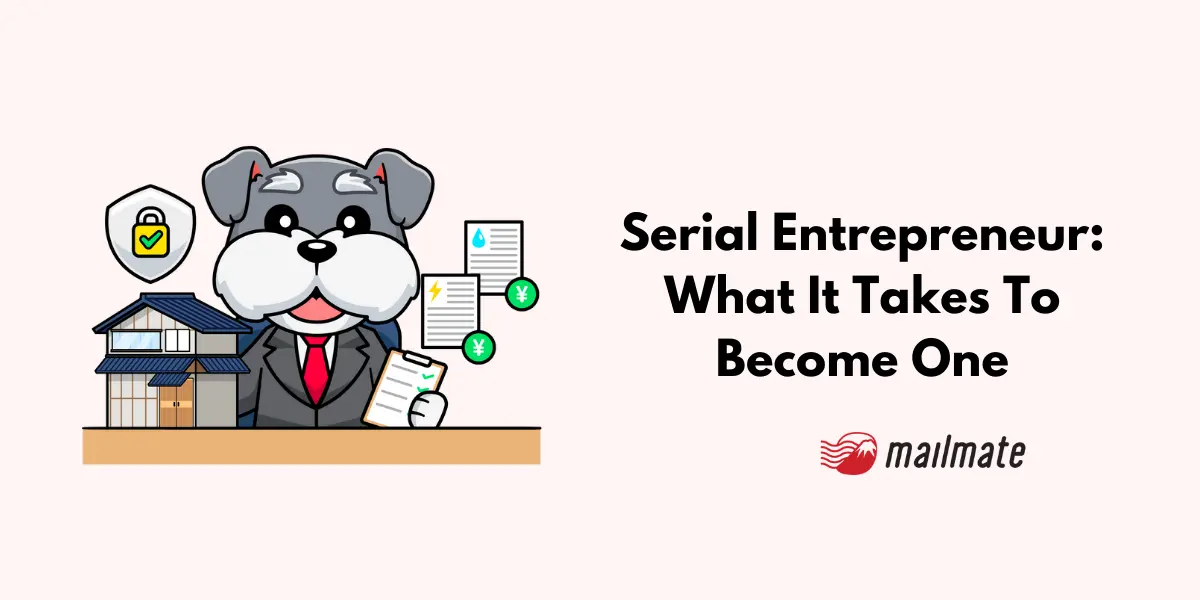Serial Entrepreneur: What It Takes To Become One

Becoming an entrepreneur is one thing, but becoming a serial entrepreneur takes it up to a whole new level.
Here, you will have everything you need to know about serial entrepreneurship and what it takes to become one.
What is a serial entrepreneur?
A serial entrepreneur is someone who starts and runs multiple businesses. They may simultaneously start multiple businesses, or they choose to step back or sell one before beginning another.
It is different from a typical entrepreneur who is known for one business company.
Starting, running, and letting go of multiple businesses is a defining characteristic of serial entrepreneurship.
Pros and cons of being a serial entrepreneur
Like any entrepreneur, becoming a serial entrepreneur has its pros and cons.
The pros of being a serial entrepreneur

a. Multiple streams of income
Instead of relying on a single business venture, serial entrepreneurs can diversify their revenue thanks to the numerous businesses they own simultaneously.
For example, a serial entrepreneur who has a technology startup may also have investments in real estate and owns a restaurant. Regardless of their performance, there is still a steady flow of income.
b. Expanded network for opportunities
Starting and managing multiple businesses is an opportunity to build up a diverse network of contacts and connections.
For example, a serial entrepreneur who has successfully launched a tech startup might have connections with venture capitalists and other industry experts to secure funding for more business opportunities, partnerships, and collaborations.
c. Greater professional skills growth
Each new business venture has an opportunity to refine existing skills and develop new ones.
Many serial entrepreneurs are in leadership roles where they manage numerous teams, make tough decisions, and take responsibility for any success or failure of their businesses.
There’s always something new to learn and develop from the numerous businesses a serial entrepreneur runs.
The cons of being a serial entrepreneur

a. High failure rate
According to the Bureau of Labor and Statistics, 1 out of 5 new businesses fail during the first two years of opening.
While failure is a natural part of entrepreneurship, it can be a learning experience for your other business ventures.
However, it can be emotionally and financially draining when multiple businesses fail simultaneously.
b. High levels of stress
Becoming a serial entrepreneur can be rewarding. However, it is physically and mentally demanding due to the high stakes and demanding nature of creating and maintaining multiple businesses.
Each venture has unique challenges, including securing financing, managing operations, and meeting investor expectations. It is always emotionally draining when faced with the possibility of a business failure.
Despite these challenges, the drive to build and create keeps serial entrepreneurs moving to the next business opportunity.
b. Lack of work-life balance
Many serial entrepreneurs will sacrifice their personal lives for their business. The high demands of running multiple businesses require focus, leaving little time for personal interest and self-care.
How to become a serial entrepreneur
FreshBooks’s 3rd Annual American Self-Employment Report states about 30% of self-employed people are serial entrepreneurs. So, here is how you can become one.
1. Pick an industry you know and understand well
Entering an industry you know best allows you to utilize your expertise, experience, and network.
You can immediately hit the ground, anticipate market trends, and navigate any challenges more easily than in an unfamiliar industry.
Once one business has a stable foundation in one industry, you explore adjacent markets or sectors for better risk management.
2. Evaluate your business plan
A thorough business plan is a roadmap to help guide your startup or business throughout its various stages of growth.
Your plan should outline clear objectives, analyze the target market, understand the competitive landscape, develop marketing strategies, and establish operational logistics. Plus, this plan can help pinpoint potential risks and rewards, understand your financial requirements, and set realistic milestones for your business.
An important aspect of business planning is that only some things will go according to plan. So it’s crucial to have strategic pivots to navigate the ebbs and flows of any business operation.
3. Start a business and build a strong foundation
Starting a business doesn't always require a large sum of money. The key is building a strong business foundation, which involves a business model, understanding your customer base, and developing efficient operational processes.
Remember, your first business is a learning experience to help you set up more business ventures in the future.
4. Balancing your workload
Balancing your workload between different businesses while maintaining a work-life balance is crucial to being a successful serial entrepreneur.
Multitasking and prioritizing tasks are great skills, but it can be overwhelming once you have many projects to do at once.
The key here is to delegate responsibilities to your trusted team members who share your vision. Not only will it lighten your workload, but it will also bring a different perspective and skill set to your business venture.
The characteristics of being a serial entrepreneur
There’s no right or wrong when you want to become a serial entrepreneur, but there are a few traits to become one.
The drive: you need to have passion for your business ventures because they will take up a majority of your time.
Goal-oriented: Setting clear, achievable goals keeps you focused and motivated to see your business grow.
Innovate and adapt: don't give up when you face a business hurdle. Being able to adapt and problem-solve will keep you on top of any changing market demands.
A strong social connection: being able to create and maintain your network of contacts of investors, mentors, and colleagues will give you support, advice, and resources.
Learn from failures: reflect on what worked and what didn’t with your business venture. Then, you can apply these lessons to your future endeavors.
Who are serial entrepreneurs?
These two people are well-known American entrepreneurs who are considered serial entrepreneurs.
Elon Musk
He is one of the most prominent and modern serial entrepreneurs out there.
His first entrepreneurship was with a company called Zip2, a searchable business directory. Muck then moved to X.com, which later became PayPal, and then became a subsidiary of eBay.
These early successes laid the foundation for Musk to found or invest in companies such as SpaceX, Tesla Motors, and The Boring Company. With enough funding, he purchased Twitter, now rebranded as X, in 2022.
Oprah Winfrey
She is well known for her award-winning talk show, “The Oprah Winfrey Show.” Winfrey established her own media production company, Harpo Productions, which owns the rights to her talk show, “The Oprah Winfrey Show.” From there, she launched O, The Oprah Magazine and Oprah Winfrey Network (OWN).
In closing
The journey of becoming a serial entrepreneur is filled with challenges but with endless possibilities for growth. Whether carving your own path or taking inspiration from modern serial entrepreneurs, each business venture is a stepping stone into your business ideas.
Spending too long figuring out your Japanese mail?
Virtual mail + translation services start at 3800 per month. 30-day money-back guarantee.

